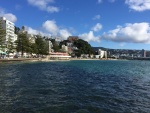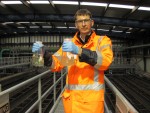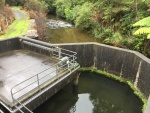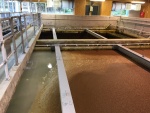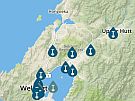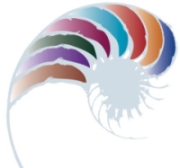
All LEARNZ field trips targeting primary and secondary schools are closely linked to the New Zealand curriculum, in particular science, social studies and geography. They can also be used by other subject teachers.
Key concepts
Conservation, drinking water, environment, fresh water, future focus, infrastructure, managing resources, potable water, recycling, rivers, stormwater, sustainability, wastewater, wastewater treatment, water, water cycle, water management, water quality, Wellington
The New Zealand Curriculum - NZC
Key Competencies
LEARNZ virtual field trips contribute to the development of all five key competencies:
| Key Competencies | Examples of Related Field Trip Components |
| Thinking | Constructing questions to put to experts during Web conferences. |
| Using language, symbols and texts | Interpreting and making meaning of a variety of language and symbols in the Background Pages and throughout the web site. |
| Managing self | Numerous content-related Activities provide students with chances to engage with the material and create their own interpretation of the content. |
| Relating to others | Videos connect students with a range of expert opinions. Students listen actively when seeking answers to video questions. |
| Participating and contributing | LEARNZ Virtual Field Trips are an ideal medium for group-based topic inquiry. They also enable students to transfer new learning into the context of their own communities where they are encouraged to take action. |
(See page 12-13 NZC 2007)
Values
The People and Water field trip encourages, models and explores these values:
- innovation, inquiry and curiosity
- ecological sustainability
- community and participation
(see page 10 NZC 2007).
E-learning and pedagogy
The People and Water field trip directly involves learning that is supported by information and communication technology (ICT).
In particular, the trip will:
- Assist the making of connections by enabling students to enter and explore new learning environments, overcoming barriers of distance and time.
- Facilitate shared learning by enabling students to join or create communities of learners that extend well beyond the classroom.
- Enhance opportunities to learn by offering students virtual experiences and tools that save them time, allowing them to take their learning further (Page 36 NZC 2007).
Social Science
| Strand | Achievement Aims | Background Pages | Related Activities |
|
Social Studies
|
Continuity and Change
Place and Environment
Identity, Culture, and Organisation
Economic World
|
|
Science
Technology
Technology
Mathematics
| Strand | Achievement Aims | Background Pages | Related Activities |
|
Number and Algebra
|
Level 3: Use a range of additive and simple multiplicative strategies with whole numbers, fractions, decimals, and percentages Level 4: Use a range of multiplicative strategies when operating on whole numbers Level 4: Generalise properties of multiplication and division with whole numbers |
|
|
English
The selected processes and strategies indicators used in the table below are from Level three of the NZC, but aim to cover indicators from levels two to four.
| Strand | Processes and Strategies Indicators | Example of Related Field Trip Component |
|
Speaking, Writing and Presenting
|
|
|
|
Listening, Reading and Viewing
|
|
|

